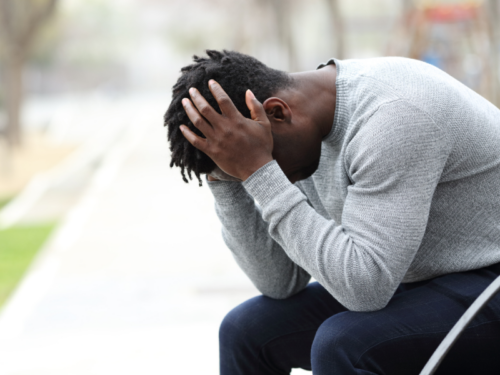
Table of Contents
Yes, Reactive Depression Is Real — and It’s Different Than Depression

Written By: Sarah Fielding

Clinically Reviewed By: Austin Chason
August 5, 2025
5 min.
Learn about the causes and treatment options for reactive depression.
Learn more about our Clinical Review Process
Table of Contents
Everyone experiences hard times, but sometimes a stressor can put you into a depressed mood or cause symptoms like sadness or fatigue. In severe instances, these feelings may indicate you’re experiencing reactive depression, also known as situational depression or adjustment depression.
According to Charlie Health Group Facilitator Nicole Lonano, MS, reactive depression is different from other mood disorders because it develops in response to a specific stressor or traumatic event. “Reactive depression is often triggered by external stressors rather than an internal chemical imbalance or a biological predisposition,” she says.
Reactive depression can occur at any age, including in children and teens. Charlie Health Licensed Creative Arts Therapist Courtney Way, MA, LCAT points out that switching schools, divorce, or moving can all be triggers. Read on to learn more about reactive depression and what treatment options are available.

Virtual depression treatment
Intensive therapy for serious mental health conditions, including depression.
Causes of reactive depression
There is a range of triggers, typically challenging life changes, that can cause reactive depression. According to Courtney Way, these include:
- Relationship conflicts
- Breakups
- Losing a job
- Changing jobs or careers
- Stress at work or school
- Losing a loved one
- Relocating
- Illness
- Injury
However, reactive depression is far from a clear-cut cause and effect. “It’s important to note that what causes reactive depression in one person may not affect another in the same way — individual coping styles, resilience, and life history all play a role,” says Charlie Health Contemplative Practitioner Tairesha “Sunflower” Flemister, LMSW.
How reactive depression symptoms differ from other depressive disorders
Depression comes in many shapes and sizes, with each condition bringing specific depressive symptoms and experiences. As Charlie Health Group Facilitator Chris Hinton, MS, M.Ed., LPC, CLC, CTP, explains, “Reactive depression differs from other types of depression, particularly major depressive disorder (MDD) and persistent depressive disorder (PDD) in several important ways, including its cause, duration, severity, and treatment approach.”
Here are the different characteristics of reactive depression, compared to other depressive disorders.
1. Based on triggers
As discussed above, reactive depression is a stress response to a specific event. Whereas other forms of depression, like MDD, can flare up without any specific cause, says Way. Instead, factors like biological composition can play a part in their appearance.
2. Typically shorter in duration
Reactive depression is not a chronic mental health condition, and you typically will experience it for a shorter time than other conditions. “Symptoms typically appear within days or weeks of the stressful event,” says Flemister. “It often improves as the person adapts or circumstances change, though it can become longer-lasting if untreated or if stressors persist.”
3. Less severe symptoms
Similarly, it tends to be a less severe experience than most forms of chronic depression. “While symptoms can be intense, reactive depression generally does not include the chronic or cyclical patterns seen in persistent depressive disorders,” says Flemister.

4. Different treatment plan
If you live with reactive depression, you might also undergo different treatment options than if you experienced another form of depression. “It is often treated with a focus on emphasizing coping skills, helping to adjust and adapt to change and stress, and does not necessarily require long-term treatment or the use of antidepressants,” says Way. Though in some cases, a person might benefit from taking antidepressant medication, such as selective serotonin reuptake inhibitors (SSRIs).
Options for reactive depression treatment
According to Way, the earlier reactive depression can be identified, the better. Here’s how to recognize the condition — and treat it.
1. Acknowledge how you feel
Hinton encourages you to acknowledge and validate how you feel. “Give yourself permission to feel sadness, frustration, or grief,” she says. “Suppressing emotions can worsen depression. Establish a routine with support structure and stability.”
You have experienced something difficult, and your mind is reacting to it. As Flemister says, “Reactive depression is a natural human response to hardship — it’s not a personal failure.”
2. Practice self-care
It’s all too easy to stop looking after yourself when you feel depressed, but practicing self-care is critical for your well-being. It can be something as simple as taking a short walk or making a cup of tea. Maintaining a healthy diet and sleep schedule are also great ways to take care of yourself.
3. Engage in mindfulness
Again, doing little things for yourself when you don’t feel well can be challenging. But incorporating little moments of mindfulness into your life can be really impactful. Ground yourself through deep breathing exercises, meditations, journaling, and other emotionally regulating activities.
You can also be mindful while engaging in physical activity like walking, stretching, or gentle yoga. Hinton recommends trying this for a better night’s sleep and mood.
4. Set small goals
Doing things can feel very overwhelming after an adverse life event. Let yourself think smaller instead of expecting yourself to change things completely or accomplish something big. “Completing manageable tasks can restore a sense of agency,” says Flemister. These actions might be applied to a single job or making lunch. Think about what feels both doable and beneficial to your well-being.
5. Seek support
As Flemister says, “connection helps prevent isolation.” Your support system — whether it’s friends, family, or a mental health professional — can help you cope with reactive depression.
Loved ones can provide a significant amount of support when you’re living with reactive depression. A therapist can provide additional care and guidance. “Seeking professional help and using cognitive behavioral therapy can help with identifying and changing negative thought patterns and developing healthy coping strategies,” says Lonano.
Way and Flemister caution that you might also require care if your reactive depression symptoms continue for more than six months or worsen as time goes on. These signs could indicate that you’re experiencing another form of clinical depression, like MDD or PDD. A mental health professional can help determine if this is the case and provide you with proper care. Contact a professional if you experience suicidal thoughts or other symptoms of severe depression.

How Charlie Health can help
If you or a loved one is struggling with a mental health condition like reactive depression, Charlie Health is here to help. Charlie Health’s virtual Intensive Outpatient Program (IOP) provides more than once-weekly mental health treatment for dealing with serious conditions, including mood disorders. Our expert clinicians incorporate evidence-based therapies into individual counseling, family therapy, and group sessions. With treatment, managing your well-being is possible. Fill out the form below or give us a call to start healing today.




